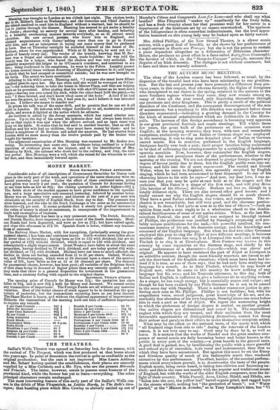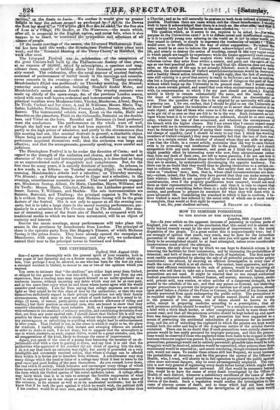THE AUTUMN MUSIC MEETINGS.
The close of the London season has been followed, as usual, by the dispersion of the tuneful host who have been ministering to our gratifica- tion. But the last and present year have presented a difference from pre- vious years, in this respect, that whereas formerly, the flights of foreigners who immigrated to our shores in the spring, returned in the autumn to the more Southern regions whence they came, they now remain among us, many of them all the year round, only dispersing themselves through our provinces and sister kingdoms. This is partly a result of the political disorders of the Continent, and the consequent discouragement of the arts of amusement; but a tendency in this direction was apparent before those disorders commenced,—indicating a growing demand in the Country for the kinds of musical entertainment which are fashionable in the Metro- polis. The increase of this foreign ascendancy is becoming very apparent at our great provincial festivals and music meetings. Till within these few years, the great balk of the performers on those occasions were English; at the morning oratorios, they were, with rare and remarkable exceptions, exclusively so—if an Italian or German singer was employed in the morning, it was to sing some detached piece of Italian or German sacred music. But in oratorios, performed in the English language, foreigners hardly ever took a part; their proper function being understood to be that of enlivening the evening concerts by a sprinkling of fashionable operatic novelties. Now, however, they outnumber the English singers, and take the most prominent share of the performances, whether in the morning or the evening. We are not disposed to grudge foreign singers any degree of favour justly due to them, but the English public runs into ex- tremes, and falls into fits of mere enyouement. The candid and liberal Weber, when he came to England, was agreeably surprised by English singing, which he had been accustomed to hear disparaged. In one of his charming letters to his wife he says—" And now, my dear love, I can as- sure you that you may be quite at ease both as to the singers and the orchestra. Miss Paton is a singer of the first rank, and will play Reins [the heroine of bis Oberon] divinely. Braham not less so, though in a totally different style. There are also several other good tenors; and I really cannot see why the English singers should be so much abused. They have a good Italian education, fine voices, and expression. The or- chestra is not remarkable, but still very good, and the choruses particu- larly so. In short, I feel quite at ease as to the fate of Oberon."—Such an opinion from such a man ought to be a wholesome cheek to the double- refined fastidiousness of some of our native critics. When, at the last Bir- mingham Festival, the part of Elijah was assigned to Staudigl instead of Phillips, the preference was justified by Staudigl'e surpassing and pro- bably unique qualifications for the task,—his powerful intellect, his con- summate mastery of his art, his dramatic energy, and his knowledge and command of the English language. But when we find two other Germans employed this year to sing the Elijah at two different meetings, it becomes another affair. Formes has sung it at Liverpool this week; and next week Pischek is to sing it at Birmingham. Herr Formes was known in this country by some reputation on the German stage, and chiefly by the actual performance of a character—Leporello—which was clever and original. He appears to have sustained the part of Elijah at Liverpool in an artistlike manner, though the most friendly reporters are forced to ad- mit the drawback of his English elocution; which must have been bad in- deed if it is true, as one of them says, that he had only been studying our language for a month. As to Herr Piscbek, whatever lie may know of English now, when he came to this country he knew nothing of any language but his own; and his Teutonic utterance, to this day, both of Italian and English, is sufficient to give a ludicrous air to anything serious. As a singer, he has rough energy, but is essentially coarse and vulgar; and though he has been exalted by our Philo.Germans he is not to be named in the same day with Staudigl. There is neither reason nor justice in pre- ferring such men to Mr. Phillips. Phillips is not faultless; but, with his magnificent voice, sound judgment, great knowledge of his art, and re- markably fine elocution of his own language, Standigl alone can come before him in such a part as that of Elijah. We regret the unmeaning height to which the preference of foreign singers is carried, on another ground. Our native singers are disheartened and cowed by it. The supercilious neglect with which they are treated, and their exclusion from the most favourable opportunities of distinguishing themselves, cannot but damp their ardour and paralyze their efforts to make themselves complete artists. What may be the effect on the national taste, of the music with which " all England rings from side to side " during the intervals of the London season, it is not very easy to say. Good may be done by it, as well as harm. It is certain that the works of Handel and the great modern con-• posers of sacred music are daily becoming better and better known Co the public in every part of the country,—a great benefit to the general taste. A-good deal is gained, too, by familiarizing the public with a more graceful and refined style of execution, both vocal and instrumental, than that to which they have been accustomed. But against this must be set the flimsy and frivolous quality of much of the fashionable music thus rendered attractive by fine performance. The effect, besides, of the musical perform- ances which everywhere prevail, is to denationalize the taste of the people. English music, being never heard, is falling into oblivion and becoming ex- tinct: and this is the case not merely with the popular and traditional music of England, but with the works of the older English composers, once the de- light of their country. While Purcell, Arne, Linley, Shield, and Dibdin, are "fallen into the sere, the yellow leaf," barrel-organs grind, and ragged boys in the streets whistle, nothing but " the genteelest of tunes"; not " Water parted," or the " Minuet in Ariadne," as in Tony Lumpkin's time, but "Vi nivvisoL' or the finale to Lucia.-- We confessait-would-gtves-ne- greater leht to he the echoes Arid ue awakenercialayar Attain the Downs the fleet lay tii5ociedilor "i0f the gillkiliat firejei_sulM,'Ur the fine airs cf Love its a` Village; The Qual • , _or The IVaterrnan,—the music which, after all, is congenial to the Englisli n tioat atul-neverr fails, when it does happen to be heard, to ' comniand the -sari:apathies and affections of all classes of people.
Of the music meetings of the aerator!, sthe LiverpoorPhilharmonic Festi- val has been held this week; the Birminghum Festival takes place next week; and the "Triennial Meeting of the Three' Choirs," at Hereford, the week after next.
The Liverpool Festival was in, aelebration of the completion of the great Concert-hall built by the Philharmonic Society- of that place, at an expense of 30,0001., raised by subscription; a spacious aad mag- nificent room, capable of bolding above two thousand persons comfort- ably seated. The celebration, after the usual Manner of musical festivals, consisted of performances of sacred musk in the mornings and miscella- neous concerts in the evenings—three of each. On Tuesday morning, Mendelssohn's Elijah was performed; on Thursday morning, the Messiah; yesterday morning a selection, including Rossini's Stabat Mater, and Mendelssohn's sacred cantata Lauda Sion. The evening concerts were made up chiefly of the opera-songs, &C. of the previous London season, mixed with some well-known orchestral and instrumental solo pieces. The principal vocalists were Mesdames Grisi, Viardot, blacfarren, Alboni, Hayes, De Treffz, Corbari and her sister, A. and M. Williams; Messrs. Mario, Tag- liafico, Lablache, Polonini, Bartolini, Formes, Lockey, Benson, Machin, and Reeves. The instrumental soloists were, Ernst on the violin, Halld and Benedict on the pianoforte, Piatti on the violoncello, Bottesini on the double- bass, and Vivier on the horn. Benedict and Hermann (a local professor) were the conductors. The performances on the whole went off well, though the hall was not so full as had been expected. This is ascribed partly to the high prices of admission, and partly to the circumstance that this meeting had not, like musical festivals in general, a charitable object. There being no novel features of any kind, it is sufficient to say that the performers acquitted themselves well; that the orchestra was large and effective; and that the arrangements, generally speaking, were careful and judicious.
The Birmingham Festival is to be under the direction of Costa; and in regard to the strength of the orchestra and chorus, and the number and character of the vocal and instrumental performers, it is described as being on an unprecedented scale of magnitude and completeness. But, for the first time for many years, it is entirely destitute of novelty. Its scheme, in a few words, is as follows: on Tuesday morning, Elijah; on Wednesday morning, dendelssohn's Athalie and a selection; on Thursday morning, The Messiah; on Friday morning, Israel in Egypt and a selection; in the evenings, miscellaneous concerts as usual. The vocal performers engaged are, Mesdames Sontag, Alboni, De Meric, Castellan, Hayes, Williams, and De Treffz; Messrs. Mario, Calzolari, Pisohek, the Lablaches greater and lesser, Reeves, T. Williams, and Machin. The solo instrumentalists are Sainton, Bottesini, and Thalberg ; the principal organist is Dr. Wesley. It is evident from the programme that Madame Sontag will be the great feature of the festival. She is not only to appear at all the evening con- certs, but is to take a large share in the sacred morning performances, par- ticularly in a selection from The Creation and in The Messiah. Her man- ner of executing some of the fittest airs of Handel, as compared with the traditional modes to which we have been accustomed, will be an object of curiosity and interest.
Besides the music meetings, many performances will take place this season in the provinces by detachments from London. The principal of these is the operatic party from Her Majesty's Theatre, of which Madame Sontag is the prima donna. They have already opened the campaign at Manchester, with operas in the theatre; and they will, we understand, extend their tour to the principal towns in Scotland and Ireland.



























 Previous page
Previous page